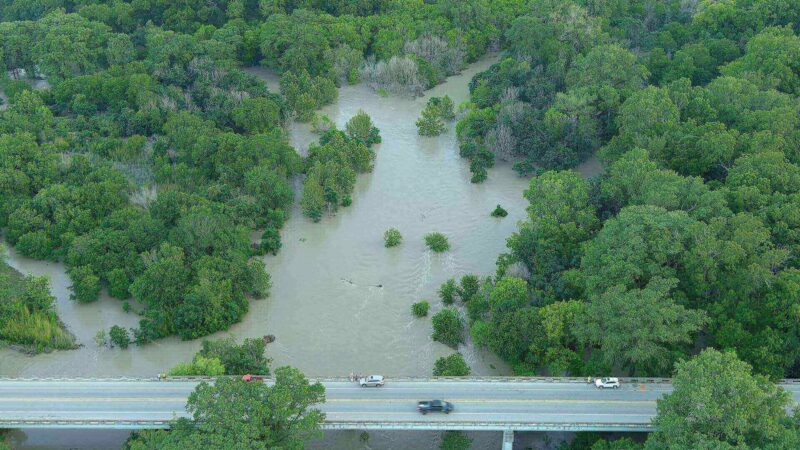When devastating floods swept through Central Texas this summer, the Guadalupe River rose with sudden force, surging more than 25 feet in less than an hour. Camp Mystic, a Christian girls’ camp outside Kerrville, Texas, was among the hardest-hit sites, as entire cabins were swept away, families were separated, with dozens dead or missing from the flooding. Communities in Kerrville, Comfort and Center Point were left in shock, with many describing it as the worst disaster their communities had seen in decades.
In the aftermath, Reverend Arlynn Ellis and her nonprofit, Acts of Hope, stepped in to help. Rev. Ellis lives just a 45-minute drive away from the Camp Mystic area and began mobilizing her network to respond.
“As soon as it happened, we provided resources to the victims, right to whoever was available,” she explained. “But the biggest challenge was people were not concerned too much about items. They were concerned about the kids.”
While many groups poured into the area with food, clothing and cleaning supplies, Rev. Ellis quickly realized families needed something different. “With the funds we have received, we provide counseling sessions,” she said. “We pay Christian counselors to meet with the families, five or six sessions at a time, and then determine how much more they need. We’ve also paid utility bills for families who couldn’t keep up while they grieved.”
This wasn’t what Rev. Ellis imagined people would need at the time. “I never thought this was what was going to happen. I thought I’d be buying groceries for people,” Rev. Ellis admitted. “But no, it became more of an emotional situation. And so we want to provide support correctly.”
Providing that support meant listening closely to the community and filling in gaps that others overlooked. Rev. Ellis recalled one mother who had long rejected faith but lost two children in the floods. “All we do is provide what we can and just be a witness — helping her without too much preaching, without too much speaking. Just loving the families.” Other parents asked for help finding new jobs after leaving their work to care for traumatized children. Still others needed help covering utility bills or medicine. “The families are just going through a lot of distress,” Rev. Ellis said. “The biggest challenge is the emotional distress that they’re going through.”
For Rev. Ellis, presence itself became a form of ministry. She recalled families saying, “I don’t need more food. What I need is a hug. I need somebody just to sit here.” Support groups and shared meals have provided safe spaces for people to voice their grief together. Rev. Ellis’s funding was able to provide childcare and food for those support groups, eliminating obstacles for those who might have otherwise opted out.
Because Acts of Hope is based nearby, but not directly in the flood zone, Rev. Ellis reorganized her intake process to make sure resources reached families directly where (and when) they need help. That means she relies on partner organizations and churches in the community who best match each family’s time/location. She and her team are often on the ground, and these partners have been key to their effectiveness.
“We can’t be a standalone location,” she reflected. “We have to work on collaborations. You also gauge the needs of the community not only through talking to families, but also through partners who are on the ground.” She described meeting a local veterans’ association that had set up grills to cook meals for neighbors daily. “I had never worked with them before, but I just went in and asked, ‘How can I help you serve this community?’ You won’t know if you don’t try.”
The weight of grief has not been easy to carry. “The first few weeks, I would just get in my car and cry,” Rev. Ellis admitted. But she has leaned on prayer, a great team around her and a deep sense of God’s capacity for abiding amid tragic circumstance. “I think God is good and faithful through all of it,” she said. “Nobody expected this devastation, so the solutions are going to be outside the box. But the Lord gives us discernment, and this is a time to put those gifts into practice.”
Looking ahead, Acts of Hope continues to fund counseling, utility bills and medicine. Rev. Ellis hopes more churches and individuals will join in sustaining this work, which offers not only immediate relief but long-term healing. “We just want to be a blessing,” she said. “This doesn’t have to be recognized as Acts of Hope. We want people to know they’re not alone.”
To learn more about Acts of Hope, visit actsofhope.org. For more stories of Wesleyans partnering in sacred work in their communities, visit wesleyan.org/news.
Rev. Ethan Linder is the pastor of discipleship at College Wesleyan Church in Marion, Indiana, and contributing editor at The Wesleyan Church’s Education and Clergy Development Division.

